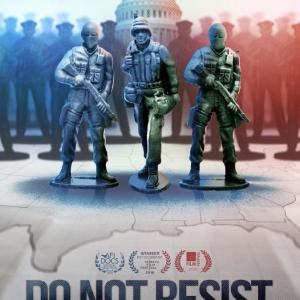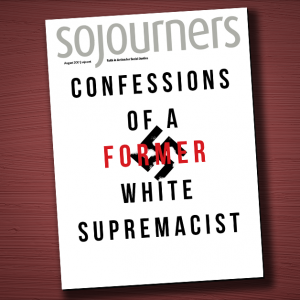Posts By This Author
New & Noteworthy: June 2018
Four culture recommendations from the editors.
New & Noteworthy

Image from IMDB.com
Forcing the Law
Do Not Resist , the 2016 Tribeca Film Festival’s Best Documentary winner, directed by Craig Atkinson, is a critical glimpse into the militarization of policing in the U.S. Where will hyped-up police training, battle armor, weaponry, and surveillance technology take us? Vanish Films
Inquiring Minds
Wary of science, or seeking a way to engage those who are? How I Changed My Mind About Evolution: Evangelicals Reflect on Faith and Science gathers stories from pastors, biblical scholars, theologians, and scientists. Edited by Kathryn Applegate and J.B. Stump. IVP Academic
Just Insights
In Radical Dharma: Talking Race, Love, and Liberation, Rev. angel Kyodo williams, Lama Rod Owens, and Jasmine Syedullah are igniting conversations in Buddhist communities around the country about the legacy of racial injustice and white supremacy in their religion. North Atlantic Books
Worldly Prayer
Through diverse writers and his own experience, Orthodox priest Michael Plekon looks beyond the formal and liturgical in Uncommon Prayer: Prayer in Everyday Experience. What are the permutations of the “Prayer of Pierogi Making”? Why should we not fear the “Prayer of Darkness”? Notre Dame Press
New & Noteworthy

Courtesy of disturbingthepeacefilm.com
Choosing a Different Way
The documentary film Disturbing the Peace describes the path former Israeli soldiers and Palestinian fighters took from armed conflict to nonviolent peace activism, resulting in the creation of Combatants for Peace. A model for overcoming polarization and rejecting violence, in an unlikely place. disturbingthepeacefilm.com
Faith Remix
Author Melvin Bray presents a creative, questioning, culturally engaged approach to our sacred stories as a path to a stronger, more just, and loving faith. Better: Waking Up to Who We Could Be is a resource for Christians “for whom uncritical certitude is no longer working.” Chalice Press
Displaced People
Global Migration: What’s Happening, Why, and a Just Response explains key issues linked to contemporary migration and practical responses, guided by principles of Catholic social teaching. By Elizabeth W. Collier and Charles R. Strain with input from Catholic Relief Services. Anselm Academic
Prophets of Profit
In Brand® New Theology: The Wal-Martization of T.D. Jakes and the New Black Church , Paula L. McGee encourages pastors and scholars to see prosperity churches as a formidable force. She explores such churches’ troubling interweaving of commerce and faith and how they disempower their majority-female congregations. Orbis Books
Letters to the Editor
A Plateful of Good Stuff
“Game Changer?” by Rose Marie Berger in the December 2016 issue really challenges me as a Catholic. We are called to be a peace church. We are disciples of a nonviolent redeemer and liberator. I want to be nonviolent. It would mean that I have to love nonviolently. I cannot call anyone names. I should love the members of the other political party and work for unity. I should be a listener. I should advise military people to be conscientious objectors in violent affairs, and maybe more than that. I will love the veterans, as I presume they did what they did according to their conscience. I have a plateful of good stuff to do. Help me, dear Lord.
Rev. Anthony Kroll
Sauk Rapids, Minnesota
Those Who Have Ears ...
In the days following the ugliest election in my life (I was born in 1945), I have seen few, if any, commentaries on how this election impacted the children of America. Our kids hear our fears and anxieties, as well as what they hear on TV or radio, but they are not able to deal with and process those fears as are adults.
What is our Christian responsibility to help our children deal with and overcome the fear and anger they feel when they hear the president-elect denigrate minority groups and promote violence against those who disagree? This is truly a teachable moment in every house of worship, and not just for adults. Our kids are suffering, and we cannot let the words of a narcissistic bigot go unchallenged. I agree with everything Jim Wallis said (“Ministers of Reconciliation,” December 2016), but I urge us not to forget the children.
Bill Turney
Houston, Texas
Ministers of Inspiration?
I was thrilled to receive my first issue of Sojourners magazine and find Jim Wallis’s article titled “Ministers of Reconciliation.” I am grateful for the reassuring inspiration I derived from his words.
Rev. Dale Morris Lee
Denver, Colorado
A Heavy Hand
In your November 2016 issue, David Gushee writes of Americans yelling at each other about abortion and our polarization on the subject (“The Abortion Impasse”). But he shows his own polarization with the sentence, “Having actually held dead 18-week fetuses in my hands ... I think it is indeed a travesty that abortion is permitted in non-emergency circumstances as late as that.” I ask him: Have you ever held the hand of an 18-year-old girl dying of sepsis from a backstreet illegal abortion? I have. When abortion is not legal or the financial cost is too high, the poor seek out the unskilled—which can take weeks—while the wealthy go to other countries. Until we have a country that cares for and about all its citizens by lowering our high infant mortality rate and doing away with guns, wars, death penalties, and cop shootings, why should anyone worry about abortions? I think the answer is: It is a way to subjugate women. As Gloria Steinem says: “If men could get pregnant, abortion would be a sacrament.”
Elizabeth Dunbar
South Hamilton, Massachusetts
New & Noteworthy

Courtesy of facebook.com/penguincountersmovie/
Tuxedos on Ice
Need a cold distraction from summer heat? Love penguins? Want to be inspired by rugged scenery and a field biologist’s enthusiasm for his work, despite harsh conditions, endless counting, and climate change? The documentary film The Penguin Counters is now out on iTunes and DVD. First Run Features
Find What’s Missing
In the picture book Who Counts? 100 Sheep, 10 Coins, and 2 Sons, biblical scholar Amy-Jill Levine and children’s book author Rabbi Sandy Eisenberg Sasso imaginatively retell three of Jesus’ parables. Suitable for kids 4 to 8. Includes afterword for parents and teachers. Illustrated by Margaux Meganck. Westminster John Knox
An American Story
Amir Hussain’s Muslims and the Making of America is a compact overview of how Muslims have been an intrinsic part of American society, politics, and culture since the colonial era. Released last fall, but timelier than ever as anti-Muslim rhetoric and actions grow. Baylor University Press
Not Alone
In Grieving a Suicide: A Loved One’s Search for Comfort, Answers, and Hope , Albert Y. Hsu explores the hard emotional and spiritual questions survivors face. First published in 2002, this newly revised and expanded version includes updated resources and a discussion guide for suicide-survivor groups. IVP Books
New & Notworthy
Prison Nightmares
Rikers: An American Jail , a documentary film from journalist Bill Moyers, draws on interviews with former detainees at a notorious facility, New York City’s Rikers Island, for insight into the violence and futility of U.S. mass incarceration. Airing on PBS in May, with faith-based viewers’ guide available for download. rikersfilm.org
Not Just a Game
Jackie Robinson: A Spiritual Biography , by Michael G. Long and Chris Lamb, details how faith helped Robinson, the first black baseball player in the major leagues, endure abuse and fight for civil rights, on and off the field. WJK
Mind the Gap
Economist Thomas Piketty’s landmark 2014 book on growing wealth inequality, Capital in the Twenty-First Century, is brilliant, but daunting at more than 600 pages. Enter Pocket Piketty, by inequality data specialist Jesper Roine, a portable and accessible introduction to Piketty’s vital and evermore-timely ideas and analysis. OR Books
Love and Dissent
With both love songs and protest anthems such as “Corrupción,” Ani Cordero’s new Latin rock album, Querido Mundo (Dear World), is a full-hearted call to embrace life and social justice in the face of disturbing politics in the U.S. and around the world. anicordero.info
Letters to the Editor
Binary, Schminary
As a Caucasian who is passionate about race reconciliation, I was over-the-moon thrilled when I read the piece by Kathy Khang, “Opting Out of the Black-White Binary,” in the November 2016 issue. I have long advocated to move beyond the black-white binary, as it excludes so many others from entering the conversation or sharing their own struggles and experiences with racism. I can’t wait to share this with others or read the book she co-authored!
Shanna Seye
via email
New Life, Old Problems
The fact that only 20 percent of the members of Congress are women should be understood as evidence that women are not seen as intelligent and as capable of wise judgment as men (“Welcome to Post-Sexist America,” by Jim Rice, November 2016). Women possess intelligence and judgment because they are, like men, human persons.
A post-sexist America would reflect this truth in the make-up of our governing body. However, a post-sexist America would also be called upon to recognize and support women in the aspect of their humanity which men do not share—women’s ability to carry and give birth to new life. Yet in this matter America is woefully remiss. The United States ranks 61st in maternal health. The risk of maternal death is higher here than in any developed country. We rank 29th in infant mortality—behind Cuba. While seven babies out of 1,000 live births die by the age of 5 in America, only three babies out of 1,000 live births die in Singapore. Surely, these figures would change dramatically in a post-sexist America.
Tesse Hartigan Donnelly
Oak Park, Illinois
Why Not Pro-Love?
David Gushee’s article (“The Abortion Impasse,” November 2016) suggests that “reducing demand” for abortions is the only meaningful path forward for us. Perhaps we can expedite this as a people by reminding ourselves that the summum bonum, or “highest good,” as far as Christian ethics has been able to articulate it, is love. Not life. Not freedom. Love. The problem love recognizes is that to choose life or freedom sometimes means death to someone. Love maximizes both life and freedom and will also sacrifice both for love. We can only be “pro-choice” and “pro-life” by being “pro-love.”
Graham Hutchins
Port Angeles, Washington
God’s heart for justice
Thank you for having the courage to print Brandon Wrencher’s November 2016 “Living the Word.” I’m a 73-year-old white lady who didn’t begin to understand God’s heart for the poor, the oppressed, and justice until I was in my 40s. For about 20 years now, I’ve been sojourning mostly with black Christians, under black pastoral leadership, and studying a plethora of books by black authors. In the lives of my black friends I have seen the truths that Pastor Wrencher has brought to light. I’m praying that I can better articulate his concepts to my white brothers and sisters.
Carol Aucamp
St. Louis, Missouri
Clarification: The 1963 encyclical “Peace on Earth” was from Pope John XXIII, not from the Second Vatican Council as we stated in our December issue.
About Loving Thine Enemies...
LOVING THY NEIGHBOR may be one of the greatest commandments, but loving thy enemies is surely the hardest. In the past few months, we’ve seen an outpouring of the former: crowds rallying at airports to welcome refugees; churches, cities, and campuses establishing sanctuary for undocumented immigrants; courageous bystanders intervening to protect strangers from harassment and violence.
But when it comes to loving the very people who have caused real harm to us and our neighbors—for example, peddlers of fake news, white nationalists, and members of certain presidential administrations—the crowd grows thin. And understandably so: Why should we extend love to those who perpetuate a politics of hate? What would loving those people even look like?
Former white nationalist Tony McAleer has an answer. As co-founder of Life After Hate, a nonprofit that helps people leave extremist groups, McAleer has seen how small gestures of compassion can transform those consumed by hate. So when McAleer met a young veteran inching toward anti-Islam extremism, he took him to meet a local imam. “It’s incredibly powerful to receive compassion from someone you’ve dehumanized,” McAleer tells Jason Byassee in our cover story.
Of course, loving your enemies does not mean condoning their actions. Neither does it mean a disregard for the safety or well-being of those who an enemy may harm, including ourselves. Yet even with these caveats, it’s impossible to domesticate Jesus’ commandment: Seeking restoration rather than retribution for those who do evil is truly radical. As Martin Luther King Jr. put it, nonviolent enemy-love forces us to recognize “that evildoers are also victims and are not evil people.” Try thinking about that the next time you see a sound bite of your least favorite politician.
Read Jason Byassee's profile of Tony McAleer, "Confessions of a Former White Supremacist," in the August 2017 issue.
New & Noteworthy
An Enduring Voice
Theologian of Resistance: The Life and Thought of Dietrich Bonhoeffer, by Christiane Tietz, is an accessible and compact biography of this German theologian, executed by the Nazis, whose writings on Christian community, resistance, and conscience hold continuing power in our times. Fortress Press
Come Together
Deidra Riggs explores God’s call to love in a way that crosses all divisions (even race and political affiliation) in One: United in a Divided World. She reflects on the aftermath of police shootings of black men as well as the fissures in everyday life. BakerBooks
Song and Poetry
The two-volume Celebrating Wendell Berry in Music features essayist, poet, and farmer Berry reading his work, music by Grammy-nominated bluesman Eric Bibb, and choral and art song settings by composer Andrew Maxfield based on Berry’s work. Volume 2, All the Earth Shall Sing, was recently released.
wendellberrymusic.org
We Gon’ Be Alright
Stakes Is High: Race, Faith, and Hope for America is a collection of essays by A.M.E. pastor, Huffington Post contributor, and social commentator Michael W. Waters. He is both blunt and lyrical as he meditates on police violence, racism, hip-hop, and the power of faith. Chalice Press
Letters to the Editor

Everett Historical / Shutterstock
Gimme Shelter
I was glad to see “Convicted of the Gospel” by Darlene Nicgorski included in the September/October issue. The “ministry of sanctuary” that she mentioned is an important and timely way to show the world we are Christians through our love. I have been lobbying my members of Congress and letting them know why my faith motivates my advocacy. The faith voice is crucial to immigration reform’s success and is necessary if we want any reforms to reflect our beliefs in human dignity, equality, and justice. I hope that the church around the country will join in the sanctuary movement, whether it is through advocacy, charity, or sheltering those who face the immediate threat of deportation.
Thomas Cassidy
Norman, Oklahoma
Base Values
You cannot reform the police state or our culture of incarceration (“Black and Blue,” by Ryan Hammill, September/October 2016) without a critique of our country’s values that proliferate fear and aggression. It’s how we were built and how we’ve sustained our way of life. Until then, taxpayers need to demand transparency from law enforcement, stop the flow of tax dollars to militarize them, and advocate for laws to protect citizens—especially citizens of color.
Tamara Cedre
via Facebook
Prophets On the Loose
I read about the Tennessee weapons plant protest (“An 82-Year-Old Nun Did What?” by Rosalie Riegle, September/October 2016) in the news when it happened. I appreciate the update. I did not know that the “prophets of Oak Ridge” were released. Few realize the danger we all face; nuclear war cannot be allowed to happen. Pray for peace and the destruction of these weapons.
Jim Halliday
Lafayette, Georgia
New & Noteworthy

Courtesy of Facebook.com/jamesbaldwinmovie
Righteous Rage
For the critically acclaimed film I Am Not Your Negro, filmmaker Raoul Peck drew upon an unfinished manuscript by writer James Baldwin and archival footage to fashion a searing narration about race in America. Opens in theaters in February. Magnolia Pictures
People of the Book
In Islam: What Non-Muslims Should Know, John Kaltner, a Rhodes College professor of Muslim-Christian relations, explains the basics of Islam, including frequently misunderstood practices. Originally released in 2003, this is a newly revised and expanded edition. Fortress Press
Multiplying Gifts
A Chicago church divided a financial windfall among its members, $500 each, telling them to use it to do good in God’s world. Laura Sumner Truax and Amalya Campbell tell the practical and inspiring lessons learned in Love Let Go: Radical Generosity for the Real World. Wm. B. Eerdmans
Displaced Prophets
Mishwar Music , by The Homsies, is a three-song EP recorded in a refugee camp in Akkar, Lebanon, with a team of youth from Homs, Syria. It is available for download on Bandcamp. mishwar.org
New & Noteworthy

A scene from outside the Pulse nightclub, October 2016. Miami2you / Shutterstock.com
Piety’s Dark Side
Love the Sinner is a short documentary narrated by queer filmmaker Jessica Devaney, who grew up in a conservative evangelical church. In the wake of the 2016 Pulse nightclub shooting, she takes a hard look at the connection between Christianity and homophobia. lovethesinnerfilm.com
Crisis and Conscience
Simone Campbell, Kelly Brown Douglas, Jacqueline M. Hildago, George “Tink” Tinker, Kwok Pui-lan, Jim Wallis, and others write about the “confessional crisis” of our political era and possible faithful responses in Faith and Resistance in the Age of Trump. Edited by Miguel A. De La Torre. Orbis
A Lifetime Adventure
Calling All Years Good: Christian Vocation throughout Life’s Seasons explores calling as something we wrestle with not just as young adults but “from infancy to old age,” combining social science insights with practical theology. Edited by Kathleen A. Cahalan and Bonnie J. Miller-McLemore. Eerdmans
Hard-Won Wisdom
John M. Perkins, co-founder of the Christian Community Development Association, has spent decades working for a gospel that is inseparable from racial and economic justice. In the memoir Dream With Me: Race, Love, and the Struggle We Must Win, he reminds us, “It all comes down to love.” Baker Books
Seven Elements of Just Peace

Ivonne Wierink / Shutterstock
In April 2016, Roman Catholics from around the world gathered at the Vatican to discuss how the church might embrace the principles of nonviolence and just peace more deeply (see "Game Changer?" in the December 2016 issue of Sojourners.)
And what does "just peace" include? Here are seven key principles:
Just cause: protecting, defending, and restoring the fundamental dignity of all human life and the common good
Right intention: aiming to create a positive peace
Participatory process: respecting human dignity by including societal stakeholders—state and nonstate actors as well as previous parties to the conflict
Right relationship: creating or restoring just social relationships both vertically and horizontally; strategic systemic change requires that horizontal and vertical relationships move in tandem on an equal basis
Reconciliation: a concept of justice that envisions a holistic healing of the wounds of war
Restoration: repair of the material, psychological, and spiritual human infrastructure
Sustainability: developing structures that can help peace endure over time
Adapted from “What Kind of Peace Do We Seek?” by Maryann Cusimano Love, associate professor of international relations at the Catholic University of America, in Peacebuilding (Orbis Books, 2010).
New & Noteworthy

Image via Picturebookmakers.com
Wherever You Go ...
In Why Am I Here?, by Constance Ørbeck-Nilssen and Akin Duzakin, a picture book for ages 5 to 9, a child ponders the many different places she could be: a huge city, an isolated forest, a war zone, fleeing to a strange land. A book that encourages empathy and acknowledges the big questions that kids ask themselves. Eerdmans
Faith for the Struggle
Shannon Daley-Harris, religious affairs adviser for the Children’s Defense Fund, offers scriptural meditations to inspire and sustain advocates and nurturers in Hope for the Future: Answering God’s Call to Justice for Our Children. Includes questions for faithful response. Westminster John Knox
No Easy Road
Activist and artist Anthony Papa writes about the challenges of rebuilding his life after serving 12 years for a nonviolent drug offense, his work to change oppressive drug-sentencing laws, and memories of prison in This Side of Freedom: Life After Clemency. 15yearstolife.com
Life Out of Death
“I did not understand how people changed so much: Some became executioners, others became victims,” writes Holocaust survivor Magda Hollander-Lafon in Four Scraps of Bread, a slim volume of piercing, simple-yet-profound reflections on her journey through hell and back. Notre Dame Press
Having Our Cake?
IN THE TERM that begins this fall, the Supreme Court will hear the case of Masterpiece Cakeshop v. Colorado Civil Rights Commission. The nine justices will decide: Is a baker with sincerely held religious objections to same-sex marriage obliged—by anti-discrimination laws—to bake a wedding cake for a same-sex couple?
But underneath the frosting, the case exemplifies a much broader conversation in which religious liberty is pitted against civil liberties. In this ongoing fight, sides are often split down partisan lines, with conservatives championing religious liberty and liberals defending civil rights.
This religious-freedom-vs.-civil-liberties split is frustrating to many. After all, religious liberty isn’t just for conservatives; the First Amendment offers important protections to all people of faith, from Muslims who seek permits to build mosques to Christians who are conscientious objectors to war. At the same time, we care deeply about civil rights, especially in an era when so many Americans face discrimination because of their gender, sexual orientation, race, or ethnicity. In a nutshell, we want to support religious freedom for all while also protecting the civil liberties of LGBTQ folks and other minorities. But is that even possible?
Baptist minister and constitutional lawyer Oliver Thomas is optimistic, but not naive. In “Clash of Liberties,” he explains how religious liberty laws morphed from bipartisan efforts to ensure religious liberty for all into tools used by conservatives and liberals alike to press their own advantage. If we’re serious about protecting both, Thomas writes, we’re going to have to do something that’s easier said than done: lay aside our ideological differences and work for the common good.
Letters to the Editor
Unchaining Hope
Thank you for uplifting one of North America’s most prophetic and inspirational persons of our time, Daniel Berrigan, SJ (“The Unchained Life of Daniel Berrigan,” August 2016). He was one of the most hopeful people for change in a time and an era when many of us felt little hope for change in the status quo. I never met him personally but was inspired by both who he was as a person and his commitment to a theology of personal involvement and activism for peacemaking.
John Fogleman
Ontario, Canada
Shame and Blame
Jim Wallis’ analysis of “intersectionality” (“The Categories That Divide Humanity,” July 2016) felt to me like an attack on local, traditional cultures, particularly those that are “white.” As a lifelong rural pastor, I know well the propensity of rural communities toward ethnocentrism. And within the context of American society, all white traditional cultures certainly bear the burden of racism. But the solution is not to dismantle all local, traditional cultures, but to fashion communities that value their heritage along with the heritage of all other cultures. Wallis’ shame-and-blame language not only fails to effect positive change in local, traditional cultures but also may well be the kind of “politically correct” discourse that drives traditional “whites” to embrace political demagogues.
S. Roy Kaufman
Freeman, South Dakota
Letters to the Editor
Unfounded Intimations?
Responding to the recent Sojourners article by Ryan Rodrick Beiler (“Undeterred by the Facts,” February 2017) regarding the arrest and detention of World Vision Gaza Director Mohammed el-Halabi, I would like to clarify the following pertinent issues.
El-Halabi has been indicted on charges of membership in a terror organization, use of material goods for terror, providing intelligence and material aid to the enemy in wartime, and illegal possession of arms and ammunition. If a plea deal will not be agreed between the sides, the Israeli state prosecution will present evidence on all these charges in a manner consistent with due process, fair trial, and maximum possible transparency given security considerations.
Hence, it is hard to understand Rodrick Beiler’s conclusion that Israel is “undeterred by the facts.” The case will move forward based only on evidentiary fact. Beiler also questions why Israel would level such charges against a Christian aid organization. The only reason is that, unfortunately, due to lack of adequate oversight, the charges appear to be true. This is probably why Western donor countries have suspended aid to World Vision Gaza operations pending trial.
We also reject and totally deny the unfounded intimations in Rodrick Beiler’s report that el-Halabi has been mistreated in Israeli custody. This is not the case. El-Halabi has also had access at all times to professional medical care and has been visited by his attorneys and family.
Itai Bardov
Embassy of Israel
Washington, D.C.
Ryan Rodrick Beiler Responds:
Itai Bardov writes at length about the fair trial that Mohammed el-Halabi will be granted by the Israeli legal system. He then declares that “the charges appear to be true.” This is consistent with the Israeli foreign ministry’s campaign, as described in my article, to hype el-Halabi’s presumed guilt long before due process has had the chance to take its course.
Recent and extensive documentation by international, Israeli, and Palestinian human rights organizations (Amnesty International, Human Rights Watch, B’Tselem, Al Haq, and others) has indicated routine use of torture and other forms of abuse of Palestinians within the Israeli legal system, adding credibility to el-Halabi’s allegations of such treatment.
Regarding el-Halabi’s alleged crimes, and the claim that “Western donor countries have suspended aid” to World Vision, I would direct Bardov to the recent investigation conducted by the Australian government’s Department of Foreign Affairs and Trade, which “uncovered nothing to suggest any diversion of government funds” on the part of el-Halabi.
While it is doubtful that the Israeli legal system will offer el-Halabi a “fair trial and maximum possible transparency,” as Bardov claims, it is certain that World Vision, the Australian government, and the international human rights community present a very different narrative from that offered by Netanyahu’s right-wing Israeli government. Whom will you believe?
Correction: Our May 2017 issue credited climate change research to the Yale Program on Climate Change Communication. The surveys were actually a partnership between George Mason University’s Center for Climate Change Communication and the Yale program.
“On the other hand…” Write to letters@sojo.net or Letters, Sojourners, 408 C Street NE, Washington, DC 20002. Include your name, city, and state. Letters may be edited.
New & Noteworthy
Woman of Valor
Coretta Scott King walked alongside her husband Martin Luther King Jr. in the civil rights struggle—and kept on working for social justice after his assassination, until her death in 2006. My Life, My Love, My Legacy is her perspective, as told to Barbara Reynolds. Henry Holt
Come Together
In Embrace: God’s Radical Shalom for a Divided World, Leroy Barber draws from decades of ministry among diverse people to argue for the centrality of relationships across differences to achieving not just reconciliation, but true justice. Encouraging, openhearted words for divisive times. IVP Books
Testify
Sometimes, liberal Christians feel they need to apologize for the behavior of other Christians or churches. In Tired of Apologizing for a Church I Don’t Belong To: Spirituality without Stereotypes, Religion without Ranting, writer and pastor Lillian Daniel encourages you instead to boldly tell your own story of faith and sacred relationship. Faith Words
Street Church
The Revolution Has Come , by Rev. Sekou & The Holy Ghost, was released in early 2016—but its gritty mix of R&B and gospel, freedom and resistance is more relevant every day. Activists/artists Osagyefo Sekou and Jay-Marie Hill met at a Black Lives Matter protest, and street movements permeate the songs. rshgmusic.com
Letters to the Editor
Pricing Carbon Fuels
Thank you for your fine article on climate change (“Shattering the Silence on Climate Change” by Teresa Myers, Connie Roser-Renouf, and Edward Maibach, May 2017). There is no larger long-term challenge facing humankind. The mention of Citizen’s Climate Lobby deserves expansion. This grassroots, nonpartisan, national group has a very workable, market-friendly proposal to help us move forward: enacting a steadily rising federal fee on all carbon-based fuels (coal, oil, and natural gas). The net revenues from this fee would be returned on an equal per capita basis to all legal U.S. residents. Such a fee would correct a failure of the market to properly price the environmental and social costs associated with use of these resources. It would have a positive impact on economic growth, would favor a transition to nonpolluting energy resources, and would be fair to low-income residents.
Kenneth Piers
Grand Rapids, Michigan
The Pride of Milwaukee
One of the names in Lisa Sharon Harper’s “Find the Cost of Freedom” (May 2017) was instantly familiar to me: James Cameron, the only young man “spared” from lynching, by imprisonment. I only wish Harper could have gone further in highlighting Cameron’s life. Having lived most of my life in the Milwaukee metro area, I have heard so much about Cameron—an extremely studious man and founder of the Black Holocaust Museum, a one-of-a-kind exhibition. Cameron was an exemplary man. He should be much more well-known than he is, and for much more than that he escaped a lynching. He was (and still is, as his heritage lives on) a very important man for Milwaukee residents.
Lynne Gonzales
Pewaukee, Wisconsin
Heartless Housing Policy
I was very happy to read the recent article “Raise Your Hand if You Live in Subsidized Housing,” by Neeraj Mehta (June 2017). It helps to uncover how we “allocate resources to people we value” and shows the inequality of how we subsidize housing in America. From my work with Hearts for Homes in Macomb County, Mich., it is clear to me that negative biases and stereotypes of low-income renters justify inaction on the part of policy makers and middle-class Americans. With the numbers of homeless children on the rise, at a time when employment is the highest since 2001, we still easily blame the poor as “not being responsible” or “having bad spending habits.” However, we seem unable to acknowledge or take responsibility for a housing system that requires many families to pay more than half of their income in housing expenses, putting many at risk of homelessness.
Richard Cannon
Mt. Clemens, Michigan
Cone’s Cross
Reading Danny Duncan Collum’s piece on Reinhold Niebuhr (“The Niebuhr We Need,” April 2017) and viewing the new documentary by Martin Doblmeier sent me back to my own review of America’s cold war theologian (“Apologist of Power,” March 1987). I write to commend James Cone’s chapter on Niebuhr in The Cross and the Lynching Tree (Orbis, 2011). Cone argues that Niebuhr’s theology of the cross was so abstract that it never occurred to him to recognize the most obvious representation of the former in the latter. Though still faculty at Union Seminary, Cone was not interviewed for the film.
Bill Wylie-Kellermann
Detroit, Michigan
Your response here. Write to letters@sojo.net or Letters, Sojourners, 408 C Street NE, Washington, DC 20002. In-clude your name, city, and state. Letters may be edited.
Letters to the Editor
Veterans’ Affairs
Wonderful to see Standing Rock featured on the front cover and within the February 2017 issue (“A Chorus of Resistance,” by Gregg Brekke). One other moment people might have missed: Some among the thousands of veterans supporting the water protectors went down on their knees to apologize for the atrocities committed by Army units against the Sioux people over the centuries of white hegemony. The elders forgave them. I, for one, wept at the grace of this.
Katharine Preston
Essex, New York
Where Two or More Are Gathered ...
There are some things in the article “Where Protestantism Went Wrong” (by Wesley Granberg-Michaelson, February 2017) that leave me unsettled. The article seems to indicate that a single person (a bishop or whomever) is a better arbiter of the truth than a council or a group (presbytery, synod, etc.). By declaring the priesthood of all believers, the Reformation raised up the importance of all people—educated, ordinary, or otherwise. My experience has been that, on the whole, a council or group is more likely to arrive at a truthful, correct, or workable solution to whatever issue is before them than any one individual in the group.
Mike Smathers
Crossville, Tennessee
‘Duck’ And Cover?
I finished my reading of Rose Marie Berger’s “Mosquito Manifesto” (February 2017) with a positive feeling. Almost immediately, however, another image flashed through my mind: a short cartoon in which Donald Duck goes on vacation. Sitting in his lounge chair on the lawn, relaxing at last, Donald is set upon by a lone mosquito. Those who know the temperament of Donald Duck can guess the outcome. The final scene shows the mosquito escaping into the sky as Donald destroys his mountain cabin with shotgun blasts in a last vain attempt to rid the world of this pesky mosquito.
Is there not a real danger that instead of bringing down the giant, Lilliputian style, we mosquitos might actually provoke annihilation, not just of ourselves but of many unintended victims of the wrath of the powerful who will not care who they hurt in their attempts to rid the world of us?
David Tidball
Roseville, Minnesota
Not Alter Egos
In the February 2017 issue of Sojourners, Will Willimon makes an excellent case for the need to address racism from the pulpit (“Preaching the Devil Out”). However, as a Christian mental health professional, I disagree with his contrast between preaching and psychotherapy. I agree the two are separate, but one is not inferior to the other. Willimon characterizes psychotherapy as a luxury only privileged people use. This is based on historical fact, dating back to Freud, when psychoanalysis was provided only to the very richest. Today, however, mental health is constantly striving to be available to the poor and culturally diverse. I can think of no other institution, including the American church, that is more dedicated in practice to understanding and spreading unity among diverse people groups. I suggest that therapists and pastors pursue this goal together, using our unique talents in tandem, instead of trying to become an alternative to the other.
Nick Schollars
via email
“On the other hand…” Write to letters@sojo.net or Letters, Sojourners, 408 C Street NE, Washington, DC 20002. Include your name, city, and state. Letters may be edited.











